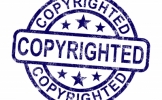Posted by Carrie Keplinger
Has someone ever used an image you created without your permission - and never even linked back to you?
Flip it around: How many times have you found that perfect image for your blog post but didn't think it was important to credit the creator?
On the internet, it's easy to feel as though everything is fair game. After all, it isn't like you went into someone's art gallery and snatched a painting off the wall.
Or is it?
Yeah, sometimes it is. Copyright law is a fuzzy sort of thing, but it boils down to this:
If it isn't yours and you haven't been given permission to use it, don't use it.
So back to your blog post. You still need an image. Pull up Google and search for the kind of image you need (ie cats). Notice that right under the search bar there's a little link called "Advanced search." Click that. At the bottom of the page there's a line that says, "Usage Rights." In the dropdown box, selected "labeled for reuse" and continue your search. Now you should only get images that have been specifically given a creative commons license - the artists have given permission for anyone to use their work for non-commercial purposes.
But wait! You still need to link back to the original artist or photographer.
This brings me to LINKwithlove, a project that is trying to get the word out about online copyright infringement.
In their own words: "It is our goal to inspire positive change to the way art, photography, design, words, music, film + ideas are shared on the internet. We believe intellectual property needs to be handled with love + respect. We believe in the goodness of people. We believe in the power of the internet. We believe that Maya Angelou was right when she said, 'When you know better you do better.'"
Want to learn about linking properly? LINKwithlove has lots of great information on crediting artists for their work. And guess what? It's really easy.
Hang on - what about other kinds of copying?
What if someone's stolen my idea and is making a similar product? What if I want to use someone else's idea as a bouncing-off point? Take a look at Polly Danger's article Inspiration or Exploitation? for a look into other copyright issues.





